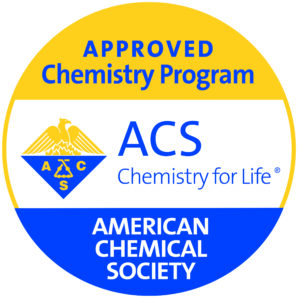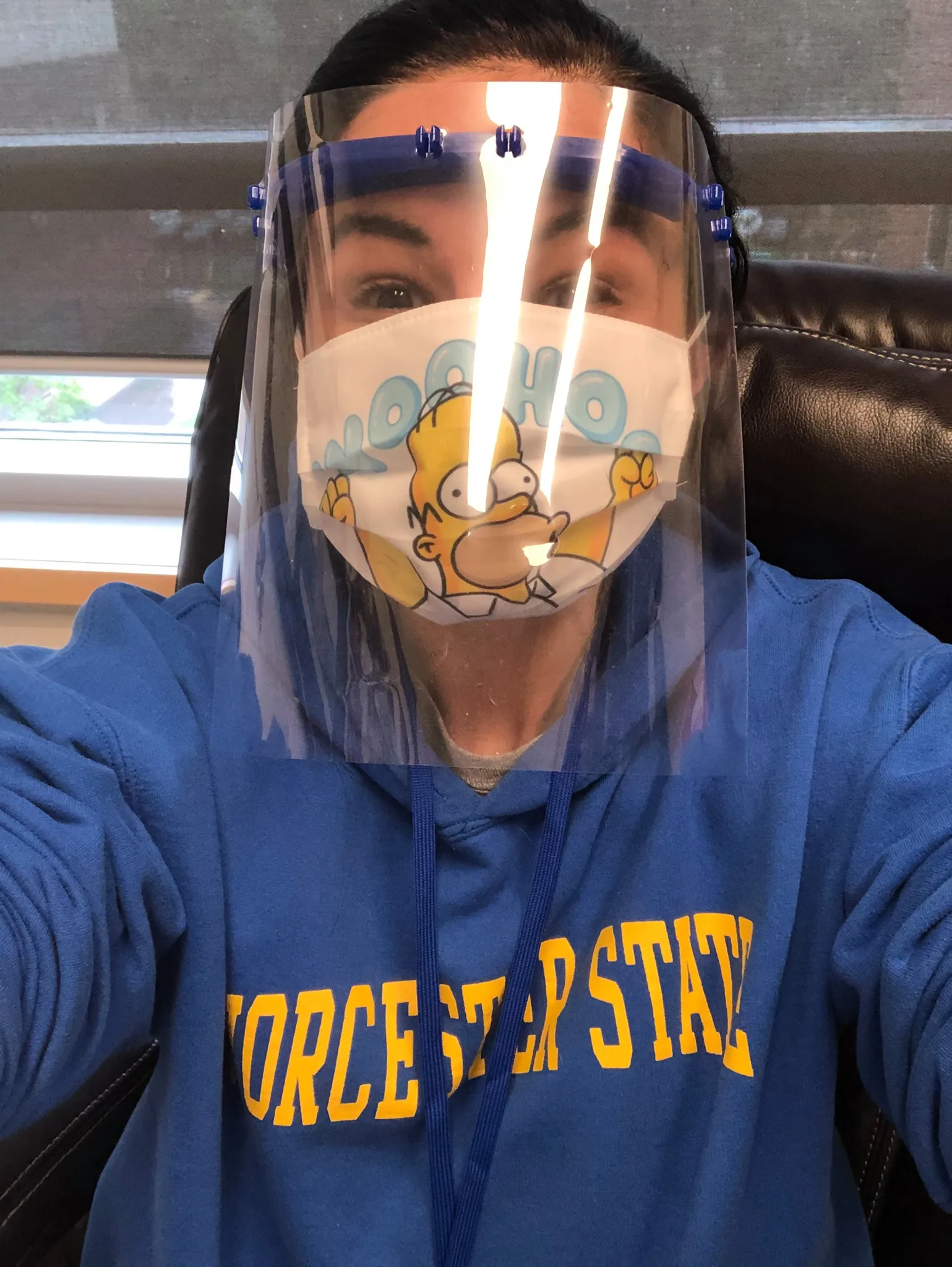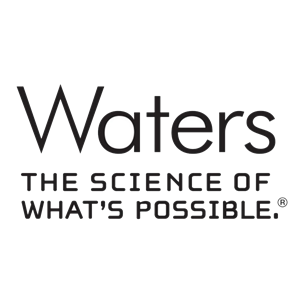Prepare for a career on the cutting edge of science with a degree in Chemistry
Get an understanding of the scientific ideas that will help you shape the future of science and technology.
The major offered by the Department of Chemistry is designed to challenge and inspire the next generation of scientific innovators with foundational and advanced courses. Often called the “central science,” chemistry offers insights into how the world works. A degree in chemistry opens doors to diverse career paths, such as medicine, environmental science, biotechnology, pharmaceuticals, forensics, and more, and equips you to make a difference in the world by addressing global challenges, including sustainability, healthcare, energy, and climate change.
In this program, you will collaborate with faculty members on groundbreaking research projects, conduct hands-on experimentation in well-equipped laboratories, develop your problem solving skills, and start building your professional network in an internship. From creating compounds in the lab to exploring the mysteries of quantum mechanics, you will develop strong foundational knowledge and analytical and critical thinking skills that you can apply in a variety of settings. You will learn about many areas of chemistry and be prepared to study advanced chemistry in graduate school.
What You Will Learn
- A strong foundation of the basic principles of general chemistry
- How to critically evaluate chemical reactions and scientific information
- How to communicate effectively about chemistry, both verbally and in writing
- How to design experiments and use appropriate experimental apparatuses effectively
- How to work effectively in teams
- How to be an ethical scientist, including a working knowledge of green chemistry

Student Stories
STEM at Worcester State
Programs for Chemistry Majors
-
The accelerated Pharmacy and Health Science option gives you the skills to be a world-class pharmacy professional in a wide variety of rewarding careers. Worcester State partners with Massachusetts College of Pharmacy and Health Sciences (MCPHS) to provide you with the most cutting-edge pharmacology education possible. This program includes three years of study at WSU and three years at MCPHS leading to completion of both BS and PharmD degrees. Students should consult with the program liaison (Daron Barnard) as soon as possible to plan their academic programs. A minimum of 120 credits is required for graduation. View requirements and timeline.
-
This concentration is intended for chemistry majors who aspire to attend medical school, dental school, or veterinary school after completing their undergraduate degree. The concentration is a means to ensure that you have the best possible academic preparation and advising as you prepare for a post-graduate program. The Pre-Medical Concentration requirements include courses that are not part of the Chemistry Major but are designated as core prerequisites for these professional schools as well as some additional courses that are not part of the core prerequisites but are strongly recommended.
The concentration curriculum also includes a one-credit seminar taken during the sophomore or junior year that is designed to familiarize you with the requirements for admission to medical, dental, and veterinary schools. The seminar will help you develop a personal plan for fulfilling these requirements so that you have the best possible chance of admission to postgraduate study. View requirements and timeline.
American Chemical Society
-
 The ACS, with its more than 160,000 members, is the major professional society in the United States for practicing chemists. The ACS sponsors major professional meetings and publishes a large number of scientific journals. Through its Committee on Professional Training, the ACS evaluates undergraduate professional education in chemistry throughout the United States. Students who successfully complete an undergraduate curriculum that meets the ACS guidelines receive certification by the society. These guidelines are lengthy but basically require 400 clock hours of traditional classwork in chemistry courses covering the fundamental areas of the discipline, and 500 clock hours of formal laboratory experience in chemistry. Math and physics courses are also specified.
The ACS, with its more than 160,000 members, is the major professional society in the United States for practicing chemists. The ACS sponsors major professional meetings and publishes a large number of scientific journals. Through its Committee on Professional Training, the ACS evaluates undergraduate professional education in chemistry throughout the United States. Students who successfully complete an undergraduate curriculum that meets the ACS guidelines receive certification by the society. These guidelines are lengthy but basically require 400 clock hours of traditional classwork in chemistry courses covering the fundamental areas of the discipline, and 500 clock hours of formal laboratory experience in chemistry. Math and physics courses are also specified.Complete details of the ACS guidelines for degree certification may be found below:
Guidelines for Bachelors Degree Programs
All chemistry majors who complete the BS curriculum will be nominated by the Department to receive certification by the ACS.
BA majors who desire to qualify for American Chemical Society certification for their degree must complete the following courses:
- CH-311: Inorganic Chemistry I (3 credits) and
- CH-328: Introductory Biochemistry (3) or BI-307: General Biochemistry I (4 credits) or
- CH-329, Chemical Aspects of Living Systems (3 credits) and
- Complete 5 credit hours of CH;397: Undergraduate Research or CH-398: Undergraduate Research/Senior Capstone Project
The research project must culminate in a written report. Students who carry out chemistry-based research in other departments may petition the Undergraduate Committee to count this research toward ACS accreditation.
Certification by the ACS is viewed favorably for admission to graduate or professional programs. Certified graduates are eligible to become members of the society after graduation; other chemistry graduates may become associate members after graduation, and members after 3 years of professional experience in chemistry or chemical engineering.
Begin the journey to a Chemistry degree
Explore sample courses in the Chemistry Major. -
-
-
-
-
-
-
-
-
-
CH-201 Organic Chemistry I
CH-210 Chemical Analysis: An Introduction to Modern Methods
CH-260 Chemistry Literature Seminar
CH-301 Physical Chemistry I
CH-320 Environmental Chemistry
CH-335 Green Chemistry
CH-350 Medicinal Chemistry
CH-410 Biochemistry I
CH-450 Computational Chemistry
CH-470 Instrumental Analysis
Prerequisites and course requirements for Chemistry Major
Frequently Asked Questions about the Chemistry Major
-
The Bachelor of Science in Chemistry at Worcester State University requires students to complete a comprehensive curriculum that includes foundational courses such as Organic Chemistry I, Biochemistry I, Computational Chemistry, and Instrumental Analysis. These courses are designed to provide students with a strong understanding of chemical principles and laboratory techniques. Additionally, students must earn a grade of C- or higher in all prerequisite courses to progress in the program.
- Yes, Worcester State University offers a Medicinal Chemistry Concentration within the Chemistry major. This concentration requires 12 additional credits beyond the standard Chemistry major requirements and focuses on the design and development of pharmaceutical agents. Additionally, students interested in pharmacy can pursue the Accelerated Pharmacy Program, which includes specific prerequisites in biology, physics, and mathematics to prepare for advanced studies in pharmaceutical sciences.
- Graduates with a Chemistry degree from Worcester State University are well-prepared for diverse career paths, including roles as research scientists, analytical chemists, pharmaceutical scientists, environmental chemists, and quality control analysts. The program also lays the foundation for further studies in medicine, dentistry, pharmacy, and other health-related fields.
- Absolutely. The Chemistry program emphasizes experiential learning through faculty-led undergraduate research projects in areas such as organic chemistry, bioanalytical chemistry, and inorganic chemistry. Students also have opportunities for interdisciplinary research collaborations and internships that provide practical experience in real-world settings.
- While a Bachelor's degree in Chemistry opens doors to various entry-level positions, pursuing graduate education can further enhance career prospects. Advanced degrees may be required for specialized roles in research, academia, or certain healthcare professions. Worcester State's Chemistry program provides a strong foundation for graduate studies in chemistry, biochemistry, pharmacology, and related fields.
Meet the Chemistry Faculty

Meghna Dilip
My research interests are broadly in the field of green and environmental chemistry and designed to facilitate undergraduate participation. Our group works with a class of non-volatile and non-flammable solvents termed ionic liquids (ILs). We are [...]

Jeremy R. Andreatta
The central theme of research in my group is the design and development of organometallic complexes for use in catalysis with a focus on green chemistry. The development of atom economical reactions, minimization of extraneous solvent use, and use of [...]




Virtual Tour
Where will your Worcester State Chemistry degree take you?


















![]()
Careers in Chemistry
- Research scientists in chemistry work in laboratories to conduct experiments, analyze data, and develop new materials, chemicals, drugs, or processes. They may work in industries such as pharmaceuticals, biotechnology, material science, or academia.
- Analytical chemists use their knowledge of chemistry to analyze substances and identify their composition and properties. They may work in industries such as pharmaceuticals, environmental science, forensic science, food and beverage, or quality control.
- Pharmaceutical scientists research and develop drugs and pharmaceutical products. They may work in areas such as drug discovery, formulation development, pharmacokinetics, or quality control in pharmaceutical companies, research institutions, or regulatory agencies.
- Quality control and assurance specialists ensure that products meet industry standards and regulatory requirements. In industries such as pharmaceuticals, food and beverage, and manufacturing, they test products for purity, potency, and safety. This role involves meticulous attention to detail and adherence to strict quality protocols.
- Environmental chemists study the impact of chemicals and pollutants on the environment and develop strategies for pollution prevention, remediation, and environmental monitoring. They may work for government agencies, environmental consulting firms, research institutions, or non-profit agencies.





